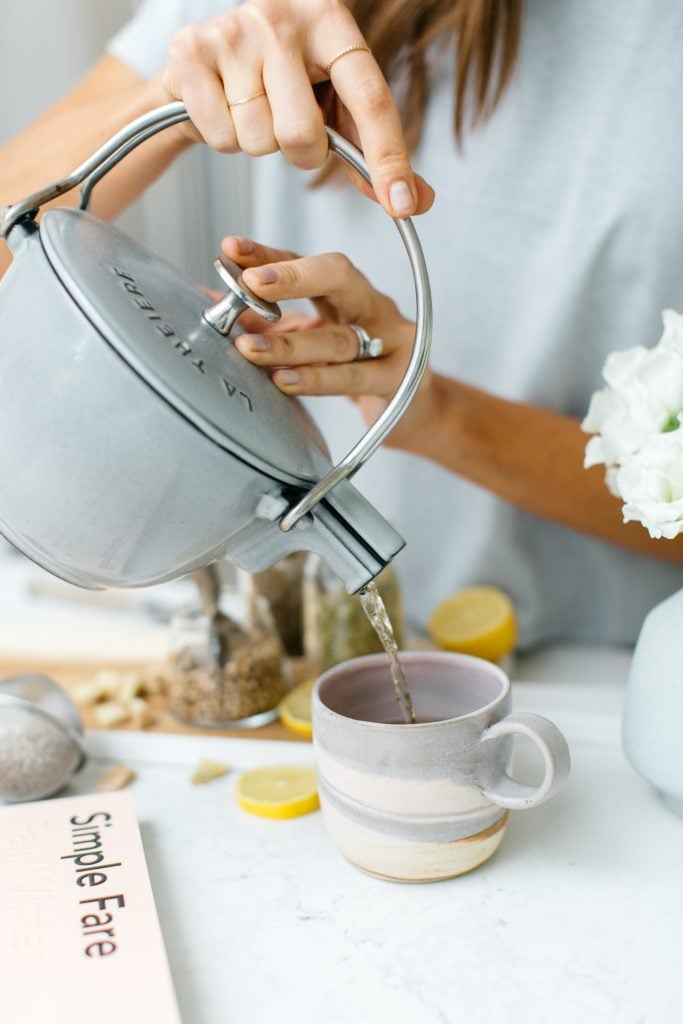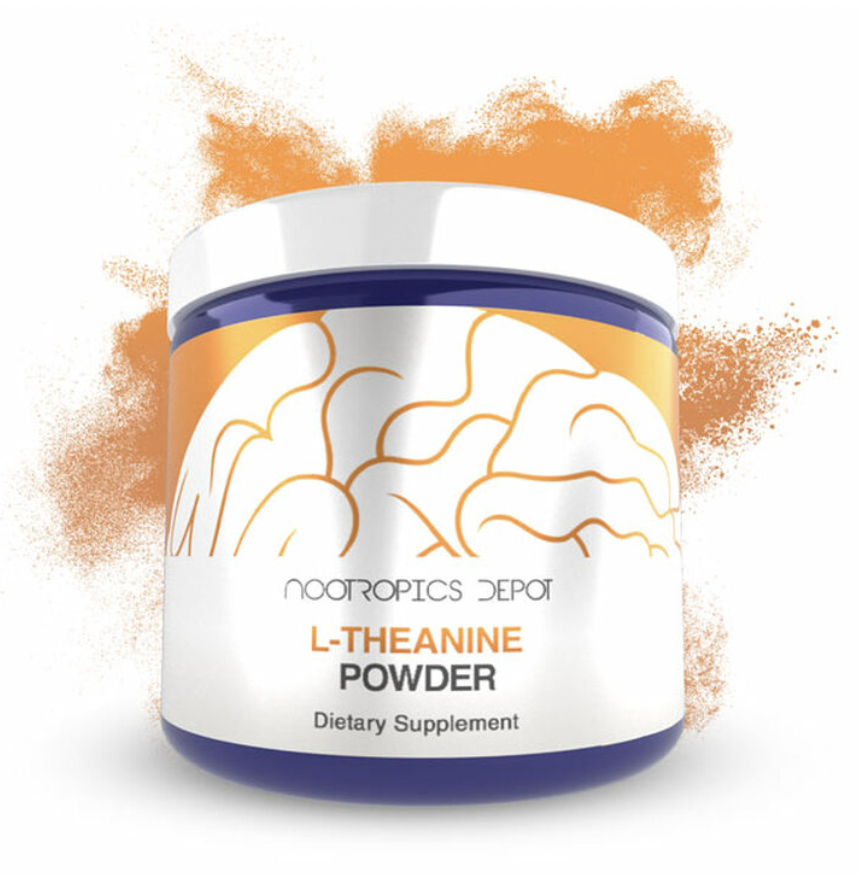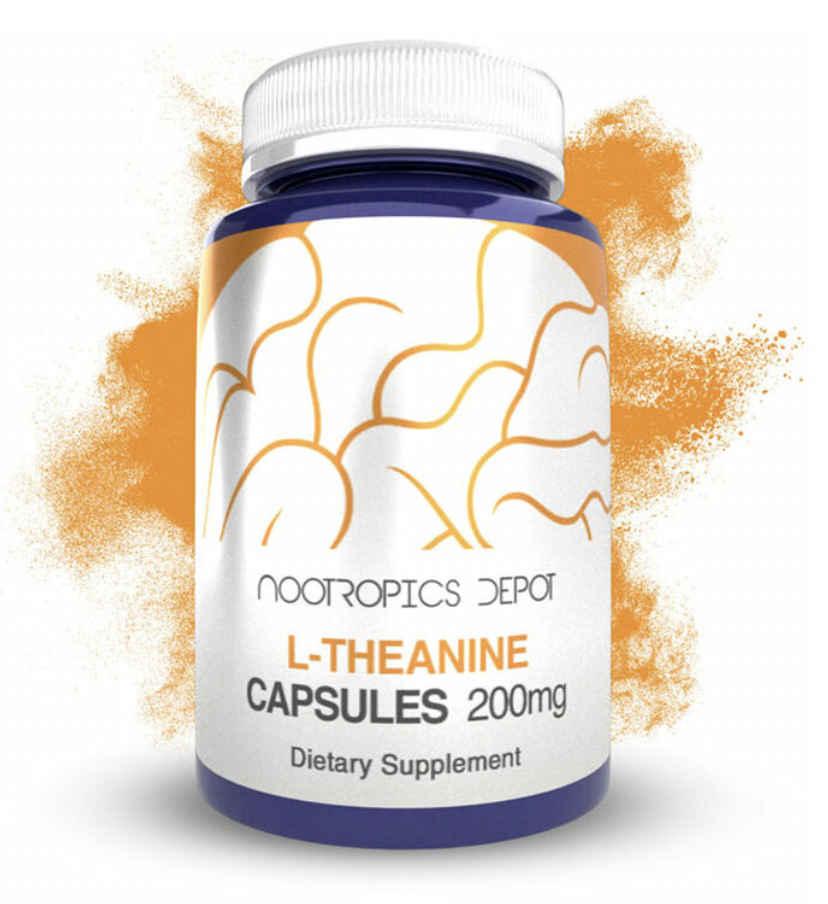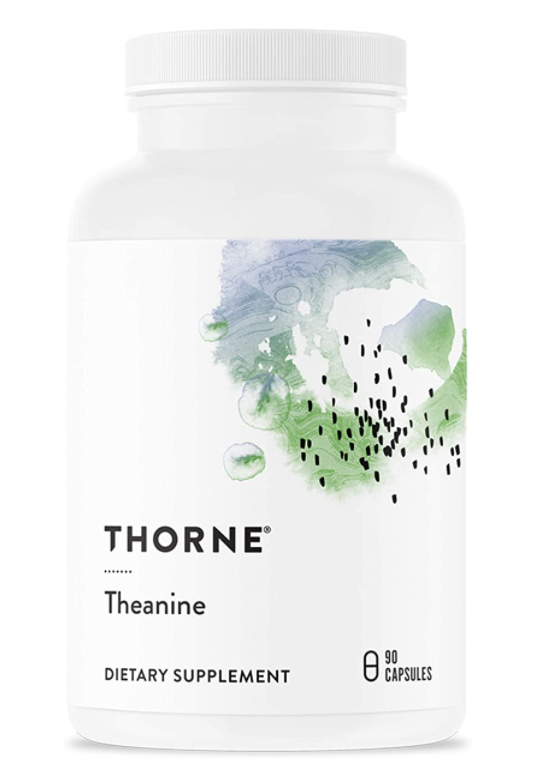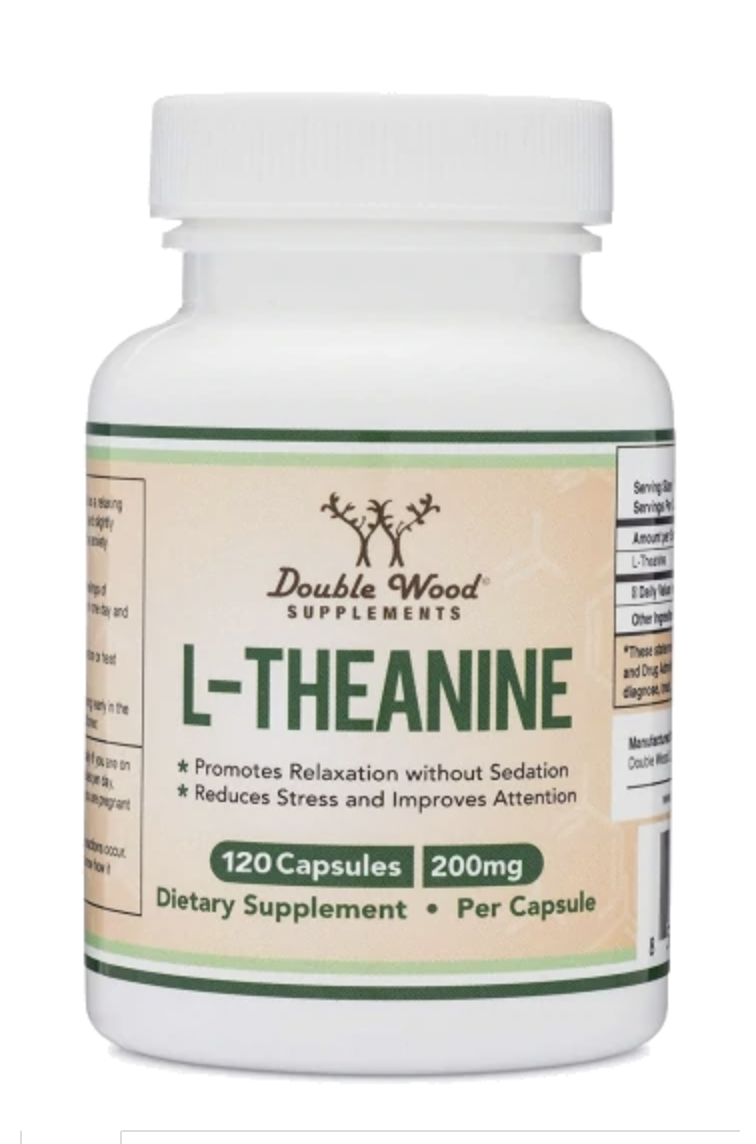There are two types of people in the world: People who love coffee, and people who love coffee but hate its side effects. If you’re like me, pounding more than two cups is a non-stop ticket to caffeine overload. If so, get this—what if I told you there was a scientifically-proven, cost-effective way to make your morning coffee work harder for you? What if you could reduce the jitters and nervousness from coffee, but also amplify the positive side effects of caffeine? Yes, it’s possible. Let me introduce you to a mighty compound called l-theanine. It’s the best of both worlds: Heightened energy with improved mental endurance. With l-theanine, you can have your coffee and drink it too. In today’s article, we’re covering what is l-theanine, where to get it, and how it can change your morning cup of joe.

What Is L-Theanine?
L-theanine is an amino acid found primarily in green and black tea. It’s actually responsible for some of the savory notes in green tea. It’s also present, in trace amounts, in some mushrooms. As far as supplements are concerned, it’s available in pill, powder, or tablet form. In essence, this amino acid is responsible for modulating aspects of brain function. It increases alpha brain wave activity (relaxing the mind without inducing drowsiness), promoting relaxation. It’s known as a nootropic—a cognitive enhancer. In this case, it’s 100% legal. Basically, its most significant benefit is its ability to reduce mental fatigue.
When l-theanine is combined with caffeinated tea, it allows the tea to induce a feeling of increased concentration over a period of time (compared to caffeine on its own). Tea doesn’t actually release caffeine into the body more slowly than coffee. In all reality, the effects of caffeine are being moderated by l-theanine. The more you know.
How Does It Help With Caffeine
So, how do the two work hand-in-hand? They’re a power couple. When combined, there’s a pronounced synergistic effect. Think heightened focus, awareness, and energy, as well as reduced stress and improved mental stamina. Studies show it has a significant effect on the general state of mental alertness. With l-theanine, you can turn your morning coffee into a tool. Rather drink matcha? We love it too. Best of all, l-theanine and caffeine can be found in abundance in a simple cup of matcha green tea.
Feature image by Michelle Nash.

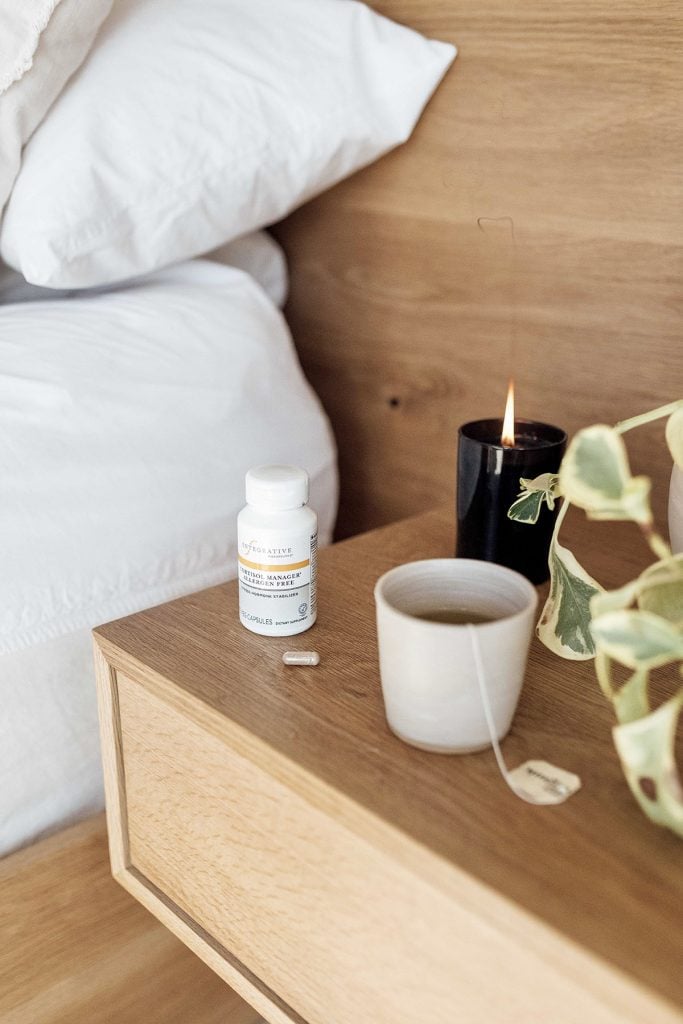
5 Benefits of L-Theanine
Although l-theanine isn’t an essential amino acid, it can still improve your health. Below are five benefits of this powerful compound.
1. It May Improve Cognitive Function
Studies show that l-theanine can boost alpha brain waves—especially in those prone to anxiety. Although it’s an amino acid, l-theanine functions similarly to an adaptogen, in terms of reducing psychological stressors and improving your stress response. For context, when you’re in a stressful situation, your body produces cortisol. And cortisol interferes with your ability to focus and make proper decisions. When you take l-theanine, it can reduce your stress hormone levels so you can focus better. As mentioned, l-theanine offers added nootropic benefits when you combine it with caffeine.
2. And May Reduce Symptoms of Anxiety
L-theanine is commonly used for relaxation. Double-blind studies have shown that it may be useful in reducing symptoms of anxiety. Interestingly, this supplement is able to help with relaxation without causing drowsiness. The calming effects have been proven for those suffering from generalized anxiety disorders and/or day-to-day anxiety.
3. It May Support Blood Pressure Management
Speaking of stress, l-theanine may be beneficial for those who experience increased blood pressure in stressful situations. One study found that people who usually experienced higher blood pressure after specific mental tasks found that l-theanine helped reduce an increase in blood pressure. In the same study, the researchers noted that caffeine had a similar but less beneficial effect
4. It May Also Boost Immunity
Some research suggests that l-theanine may improve the function of the body’s immune system. One study found that l-theanine could help decrease upper respiratory tract infections Another study found that antioxidants in green tea, doubled with l-theanine, could be effective at preventing the flu. More research is necessary, but the initial findings are promising.
5. It May Promote Sleep Quality
Some research indicates that l-theanine could be beneficial for a good night’s sleep, which could be because it helps to promote relaxation. Researchers in one study found that doses of 250 mg and 400 mg of l-theanine greatly improved sleep in animals and humans. Ultimately, l-theanine is known for its calming, centering, and sleep-boosting abilities.
Signs You Need L-Theanine
Generally speaking, do you feel like a ball of anxiety after drinking caffeine? Jittery? L-theanine can balance the effects of caffeine intake. Of course, keeping your blood sugar balanced while you drink caffeine is important, but l-theanine helps too. Because l-theanine impacts your GABA levels, it can help you enjoy the alert feelings of caffeine without feeling jittery or anxious. Ultimately, the signs you need l-theanine include shakiness when consuming caffeine, general anxiousness during the day, and lack of focus. L-theanine can also support those who have trouble falling asleep, due to the inability to relax.
Can You Get L-Theanine Through Diet?
While some teas are rich in theanine, and it’s available in supplement form, it’s not abundant in food sources. The most common food source of l-theanine is tea. While green tea tends to contain the most theanine, there are other tea varieties that are also rich with the amino acid.
Here’s the average content of l-theanine in different types of tea:
- Green tea: 6.56 mg/g
- White tea: 6.26 mg/g
- Oolong tea: 6.09 mg/g
- Black tea: 5.13 mg/g
It’s important to note that l-theanine content in tea can widely vary due to preparation time and tea processing. Also, keep in mind that herbal teas are not made from traditional tea leaves and do not contain theanine. Additionally, some mushrooms contain small amounts of l-theanine. Porcini mushrooms, for example, have this amino acid. The most effective way to get l-theanine in your diet is by drinking green tea.
How Much Can You Take?
In general, l-theanine is considered safe with no direct side effects. Most people take 100-200 mg of theanine in capsules or mix it in powder form into their coffee to balance the effects of caffeine. If you take capsules, it’s a good idea to take your morning l-theanine about 30 minutes before you start sipping your coffee. You can take this combination of l-theanine on an empty stomach without any food to aid absorption. Although there aren’t any major known side effects of l-theanine, you should still talk to a doctor before taking it as a dietary supplement—particularly if you are taking other medications or have a medical condition.
Potential Side Effects
As mentioned, l-theanine is considered safe with no direct side effects. Many l-theanine branded supplements have been labeled GRAS (generally recognized as safe) by the Food and Drug Administration. However, that doesn’t mean the government has actually studied the substances in great detail. Here’s the most important information: No major negative side effects or adverse effects have been reported in association with the use of l-theanine.
Keep in mind that if you are pregnant or breastfeeding, there isn’t enough reliable information to know if theanine is safe to use when pregnant or breastfeeding. Stay on the safe side and avoid use. For children, l-theanine is possibly safe when taken by mouth, short-term. Doses of 400 mg daily have been safely used for up to six weeks in males aged 8-12 years.


The Best Time of Day to Take L-Theanine
If you’re using l-theanine to boost cognitive function during the day, it’s best to take l-theanine about 30 minutes (in capsule or pill form) before your morning coffee. You can also add it as a powder to your cup of coffee. The ratio of caffeine to theanine is generally 1:2 (100 mg of caffeine with 200 mg of theanine). However, if you’re using l-Theanine to help you wind down at night, it’s best to take the supplement between 30 minutes and an hour before your bedtime. This gives the compound time to calm and ease your mind before you start trying to fall asleep.
Benefits of L-Theanine Supplements
Instead of chugging green tea or eating pounds of porcini mushrooms (neither of which we’d recommend), there are benefits of consuming l-theanine via supplement form. It’s effective, efficient, and versatile. L-theanine comes in pill, capsule, and powder form. Depending on your lifestyle, you can choose what best suits your habits. L-theanine is not a medication, so there are no official guidelines regarding how much you should take (please consult your physician!). However, the supplement is unlikely to cause an overdose, and l-theanine is usually available in the form of 200 mg tablets. L-theanine supplements may help you feel more relaxed, calm, and lower anxiety.
4 Supplements I Recommend
Companies like Four Sigmatic are adding l-theanine to their coffee products to help balance out your caffeine surge. Rather take a pure supplement? Below are four l-theanine supplements I recommend.
Nootropics Depot L-Theanine Powder
If you want to the most economical option, or want more control to experiment with your ideal dosage, try this powder. With over, 1,200 servings (if you prefer 100 mg doses of l-theanine), you can order a tub and use it for well over a year. Furthermore, you can choose your delivery method with l-theanine powder. You can mix it with water, blend it in a smoothie, make a paste and take it sublingually, or just add it straight to your cup of coffee. Pure l-theanine powder has a very faint taste. Instead of being extremely bitter or sour like many other nootropics, l-theanine has an almost pleasant, umami-like taste.
Nootropics Depot L-Theanine Capsules
For most, nothing beats the ease of taking a capsule. It’s relatively economical, and at 200 mg per dose, most people won’t feel tired when paired with a caffeine source of around 100 mg (about 8-ounces of coffee).
Always providing high-quality supplements, Thorne’s Theanine capsules promote relaxation, focus, and memory by enhancing alpha-wave production in the brain. It also supports a healthy stress response. Furthermore, it’s free from gluten and other major allergens.
Double Wood Supplements L-Theanine
With 120 capsules at 200 mg of l-theanine, this supplement promotes relaxation without sedation, supports healthy stress levels, improves sleep quality, and is made in the United States. Their supplements are tested for purity and potency.



